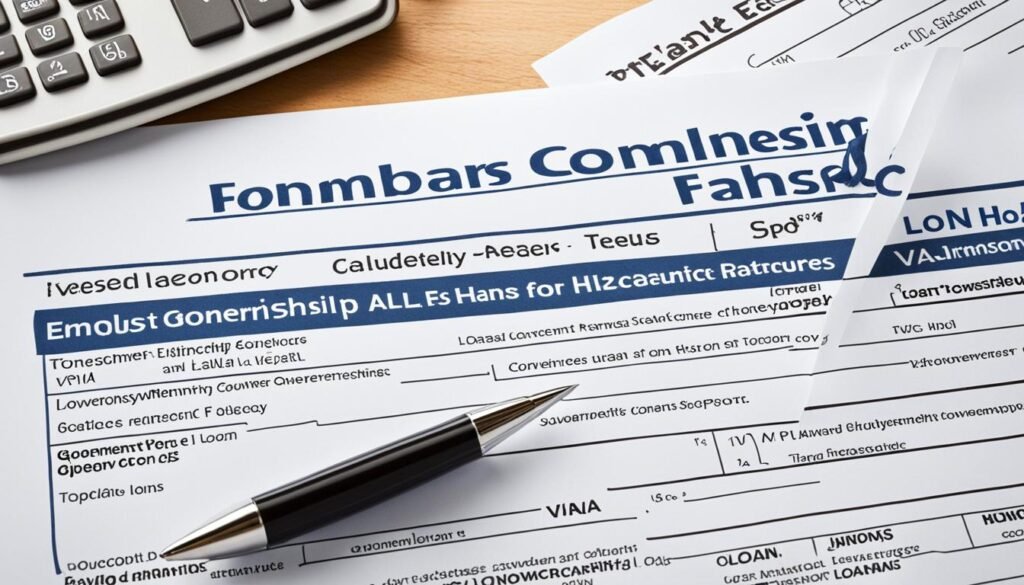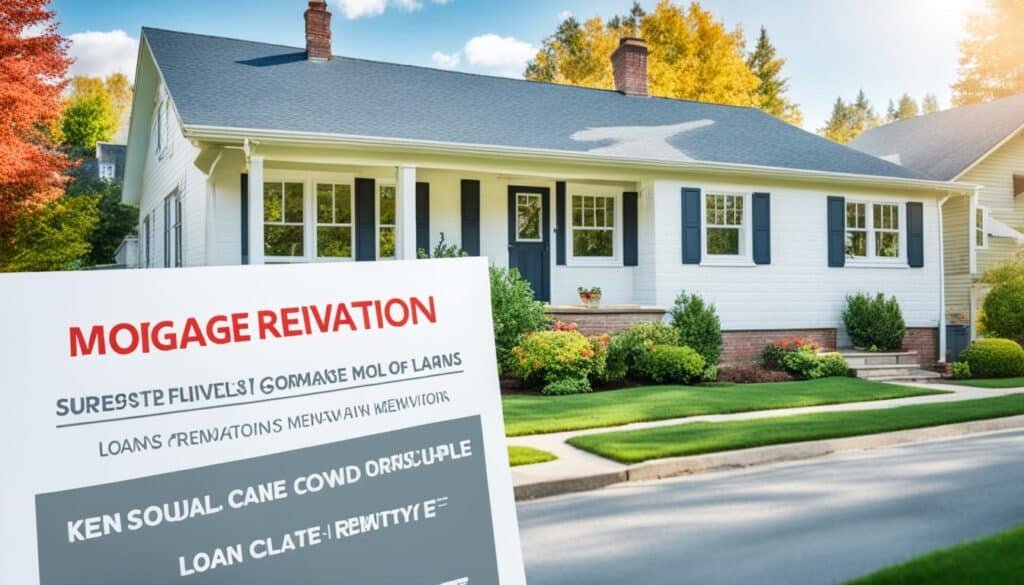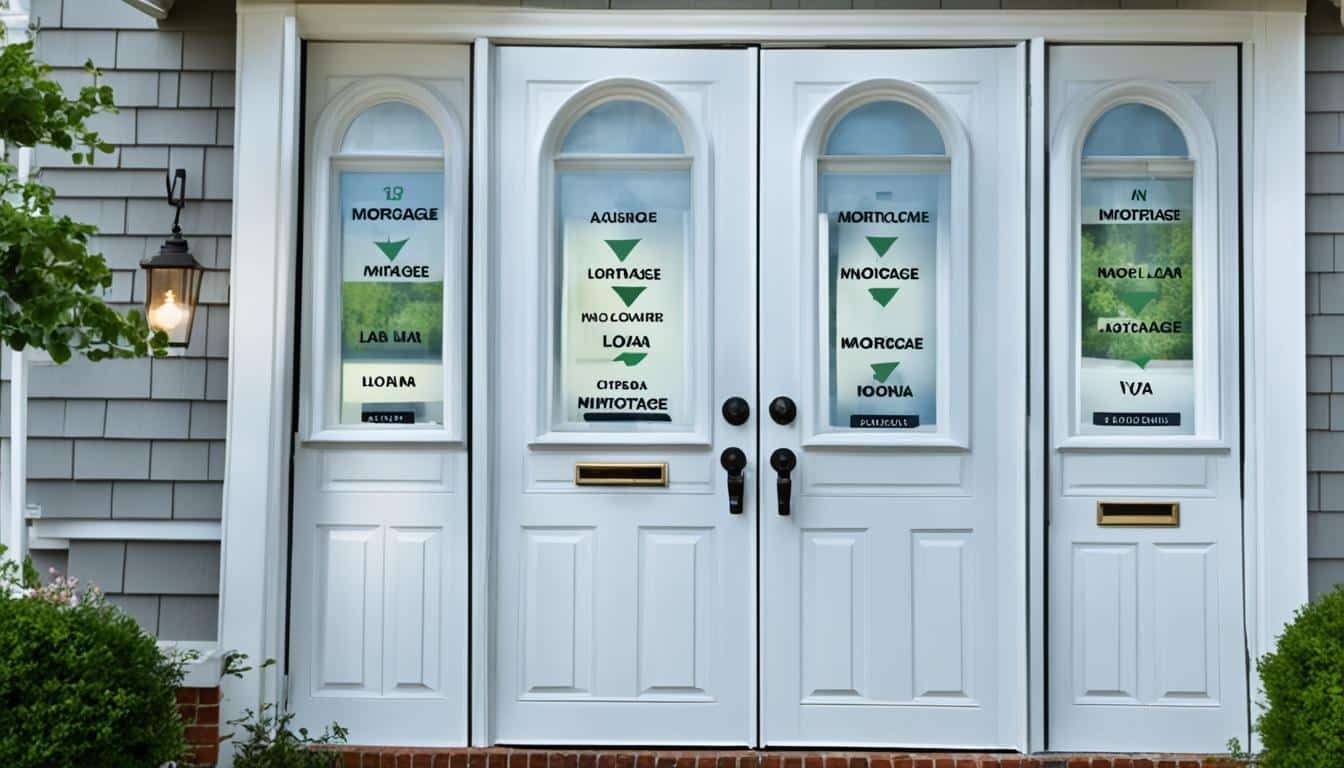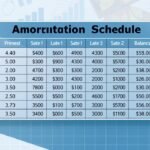Looking into mortgage loans can feel overwhelming, with many options for buyers and homeowners. You’ll find everything from standard loans to special ones for building or investing in properties. It’s key to know the different mortgage types and their features. This knowledge helps you make a choice that fits your financial plans and home needs.
Key Takeaways
- Conventional loans, including conforming and non-conforming loans, are the most common type of mortgage.
- Jumbo loans are for home purchases that exceed the conforming loan limits set by the Federal Housing Finance Agency (FHFA).
- Government-backed loans, such as FHA, VA, and USDA loans, offer unique benefits for specific borrower groups.
- Fixed-rate mortgages provide a stable, predictable monthly payment, while adjustable-rate mortgages have interest rates that can fluctuate over time.
- Specialized loans like construction loans and home renovation loans cater to specific homebuying and improvement needs.
Conventional Loans
Conventional loans are a top choice for many homebuyers. They come in two main types: conforming and non-conforming. Conforming loans follow the rules set by the Federal Housing Finance Agency (FHFA). This includes credit score, debt-to-income ratio, and loan size. If a loan meets these standards, it can be bought by Fannie Mae and Freddie Mac.
Conforming Loans
Conforming loans are easy to find and can fund primary homes, second homes, or investment properties. You usually need a credit score of 620 or higher. Also, your debt-to-income ratio should be lower than other loans. If you put down less than 20%, you’ll need private mortgage insurance (PMI).
Non-Conforming Loans
Non-conforming loans don’t meet the FHFA’s standards. Jumbo loans are the most common type of non-conforming loan. These loans are riskier for lenders because they can’t be bought by Fannie Mae and Freddie Mac. You’ll need a credit score of at least 700 and a down payment of 10% to 20% for a non-conforming loan.
| Loan Type | Credit Score | Down Payment | Debt-to-Income Ratio | Eligibility for GSE Purchase |
|---|---|---|---|---|
| Conforming Loan | Minimum 620 | As low as 3% | Lower than non-conforming | Eligible for purchase by Fannie Mae and Freddie Mac |
| Non-Conforming Loan (Jumbo Loan) | Minimum 700 | 10% to 20% | Higher than conforming | Not eligible for purchase by Fannie Mae and Freddie Mac |
“Conforming loans are the backbone of the mortgage market, providing borrowers with a more flexible and accessible path to homeownership.”
Jumbo Loans

Jumbo loans are key for buyers in pricey real estate markets. They go beyond the limits set by the Federal Housing Finance Agency (FHFA) in 2024, which is $766,550 or $1,149,825 in pricier areas. These mortgages help buyers who need more money than what Fannie Mae and Freddie Mac offer.
To get a jumbo loan, you need a great credit score, a low debt-to-income ratio, and lots of assets. This is because jumbo loans are riskier. You’ll likely need a credit score of 700 and might have to put down 10% to 20%.
Even with tough rules, jumbo loans are easier to get now. Lenders are competing more, making jumbo interest rates similar to conforming loans. This makes jumbo loans a good choice for those in high-cost real estate markets needing more money.
“Jumbo loans are an essential tool for homebuyers in high-cost markets, allowing them to access the financing they need to achieve their homeownership goals.”
Jumbo loans are a flexible and competitive way to finance a home in high-cost real estate markets. By knowing what jumbo loans require and offer, buyers can pick the best mortgage for their situation.
Government-Backed Loans

The U.S. government helps make buying a home easier for Americans. It backs three main types of mortgages: FHA loans, VA loans, and USDA loans. These loans have easier credit and down payment rules than regular loans. They help low-income people, active military, veterans, and those living in rural areas.
FHA Loans
FHA loans are insured by the Federal Housing Administration. You can get one with a credit score as low as 580 and a 3.5 percent down payment. Or, you can get one with a score as low as 500 if you put down 10 percent. But, FHA loans require mortgage insurance premiums.
VA Loans
VA loans are guaranteed by the U.S. Department of Veterans Affairs for eligible military members. These loans offer no minimum down payment, no mortgage insurance, and no credit score requirement. But, they do have a funding fee.
USDA Loans
USDA loans are guaranteed by the U.S. Department of Agriculture. They help moderate- to low-income borrowers buy homes in rural, USDA-eligible areas. These loans have no credit score or down payment requirement. But, they do include guarantee fees.
Government-backed loans are great for people who might not get regular loans because of their credit score, down payment, or income level. These special loans can help many Americans own a home.
Fixed-Rate Mortgages

Fixed-rate mortgages are a top choice for home loans because they offer stability. They keep the same interest rate throughout the loan’s life. This means your monthly payment stays the same, making budgeting easier.
These mortgages usually last 15 or 30 years. The 15-year option has a lower interest rate, but the 30-year has smaller monthly payments. Both types give you financial security, helping you plan better for the future.
One big plus of fixed-rate mortgages is locking in your interest rate for the loan’s life. This protects you from rate changes, keeping your monthly payment steady. It’s great for those who like knowing their payments won’t go up.
Though fixed-rate mortgages might have higher interest rates than some adjustable-rate loans, their stability is often worth it. You can also refinance later if rates drop, which could save you money.
| Loan Type | Interest Rate | Monthly Payment | Advantages |
|---|---|---|---|
| 15-Year Fixed-Rate Mortgage | 4.75% | $1,500 | Lower interest rate, faster equity buildup |
| 30-Year Fixed-Rate Mortgage | 5.25% | $1,200 | Lower monthly payments, longer repayment term |
Fixed-rate mortgages are great for anyone buying a home. They offer stability and peace of mind. This makes them a solid choice for those wanting predictable mortgage payments.
Adjustable-Rate Mortgages

Homebuyers can choose between adjustable-rate mortgages (ARMs) and fixed-rate mortgages. Fixed-rate loans have a steady monthly payment. Adjustable-rate mortgages offer a good choice for the short-term.
An adjustable-rate mortgage has an interest rate that can change. It often starts with a lower introductory rate for a certain fixed period. Then, the rate can change, either up or down, with market changes.
This flexibility has its pros and cons. An ARM might have a lower monthly payment at first, making buying a home easier. But, if you plan to stay long-term, you might pay more as rates change. Rate caps help protect you from big rate hikes, but ARMs are short-term loans.
Adjustable-rate mortgages are smart for those planning to move or refinance soon. But, if you want stability, a fixed-rate mortgage is better.
Mortgage Loans

Mortgage loans have different types, each with its own set of features. These features help meet various borrower needs. The loan’s size and if it’s part of a government program affect the down payment, cost, and how much you can borrow.
Lenders check a borrower’s income, job, assets, debts, and credit history to see if they can pay back the loan. Some loans are called “qualified mortgages” because they meet certain criteria. “Nonqualified mortgages” are riskier or more expensive. They are often for self-employed people or those without a Social Security number.
| Loan Type | Down Payment | Cost | Borrowing Amount |
|---|---|---|---|
| Qualified Mortgage | Typically lower | Generally lower | Higher |
| Nonqualified Mortgage | May be higher | Can be higher | May be lower |
Government rules are key in the mortgage world. They set guidelines for different loans. Knowing these rules helps borrowers make smart choices and find the right mortgage for their finances.
“Navigating the world of mortgage loans can be complex, but with the right information and guidance, borrowers can find the loan that fits their budget and long-term goals.”
Construction Loans

Building your dream home might not fit traditional mortgage options. Construction loans are perfect for this. They give you the funds to start building your new home.
Construction-to-Permanent Loans
Construction-to-permanent loans are very popular. They combine the construction loan and the mortgage into one. The lender gives you money for building costs. Then, the loan turns into a permanent mortgage after the home is done.
This means you don’t need to refinance later. It makes moving in easy.
With a construction loan, you can lock in your interest rate early. This makes your building journey more predictable.
| Loan Type | Financing Purpose | Conversion |
|---|---|---|
| Construction Loan | Covers construction costs | Requires separate refinancing |
| Construction-to-Permanent Loan | Covers construction costs | Automatically converts to traditional mortgage |
For those wanting to build and move in, a construction-to-permanent loan is great. It avoids the hassle of many loan applications. It also makes the switch from construction to permanent mortgage smoother.
Home Renovation Loans

Homeowners can get special home renovation loan options for home improvements, remodeling, and repairs. These loans help you get the money you need to change your living space. You might want to remodel your kitchen, repair old systems, or improve your property’s value.
A cash-out refinance is a popular choice. It lets you use your home’s equity for renovation projects. This can be cheaper than other ways to borrow money because you might get a lower interest rate.
- Home Equity Loans: Borrow against your home’s value for renovations and repairs.
- FHA 203(k) Loans: These government-backed loans are for home remodeling and improvement projects.
- Personal Loans: These are unsecured loans for various home renovation needs.
When looking at home renovation loan options, make sure to check the terms, interest rates, and how you’ll pay back. This helps you find the best loan for your money situation and renovation plans.
“Investing in home improvements can not only enhance your living experience but also increase the value of your property in the long run.”
Using different home renovation loan options, homeowners can make their living spaces better. This can help you achieve the dream home you want.
Investment Property Loans

Investment property loans are special loans for things like rental homes, second homes, and vacation spots. They help real estate investors with their financial needs.
These loans are different from regular mortgages. They have their own rules, interest rates, and ways to pay back. Investors need to look at their money situation, how much rent they might get, and the property’s value to pick the right loan.
Types of Investment Property Loans
- Conventional investment property loans for rental homes, second homes, and vacation spots
- FHA loans for investment property buys, including big buildings
- VA loans for investment property buys by military folks and veterans
- Jumbo investment property loans for expensive investment properties
- Commercial investment property loans for big, money-making investment properties
Each kind of investment property loan has its own rules, rates, and payback ways. It’s key for investors to look into and compare these to find the best one for their money goals and investment property needs.
| Loan Type | Typical Down Payment | Interest Rates | Eligible Properties |
|---|---|---|---|
| Conventional Investment Property Loan | 20-30% | Higher than primary residence loans | Rental properties, second homes, vacation homes |
| FHA Investment Property Loan | 3.5-10% | Comparable to primary residence loans | Multi-unit properties (up to 4 units) |
| VA Investment Property Loan | 0-20% | Competitive with primary residence loans | Rental properties, second homes |
| Jumbo Investment Property Loan | 30%+ | Higher than conforming loans | High-value investment properties |
| Commercial Investment Property Loan | 20-30% | Varies based on property type and lender | Income-generating investment properties |
When looking at an investment property loan, think about the money side, possible rent, and your investment goals. This helps make a good investment property finance plan.
Also Read : Navigating Reverse Mortgages: Pros, Cons, and Considerations
Conclusion
When looking into home financing, it’s key to know the different mortgage loan options out there. There are conventional loans, like conforming and non-conforming, and government-backed programs such as FHA and VA loans. Each option has its own benefits for different financial situations and preferences.
Are you looking for a stable fixed-rate mortgage or something more flexible? Exploring these loan types can help you find the right one for your goals. You can also look into construction loans and home renovation financing to build or improve your dream home. For those interested in growing their real estate portfolio, investment property loans are an option.
By doing your homework and comparing mortgage loan options, you can make a choice that fits your finances, risk level, and future plans. Knowing the mortgage landscape well lets you pick the best financing for you. This way, you set yourself up for a successful and fulfilling homeownership journey.
FAQs
Q: What is a mortgage loan?
A: A mortgage loan is a type of loan provided by a lender to help individuals purchase a home. The loan is secured by the property being purchased.
Q: What factors determine the interest rate on a mortgage loan?
A: The interest rate on a mortgage loan is determined by factors such as the borrower’s credit score, the loan amount, the loan term, and current market conditions.
Q: How do I calculate my monthly mortgage payment?
A: You can use a mortgage calculator to input details such as the loan amount, interest rate, and loan term to calculate your estimated monthly payment.
Q: What is the role of a mortgage lender in the home buying process?
A: A mortgage lender is a financial institution that provides the funds for a mortgage loan and guides borrowers through the loan application, approval, and closing process.
Q: What are the different types of mortgage loans available?
A: Common types of mortgage loans include fixed-rate mortgages, adjustable-rate mortgages, FHA loans, VA loans, and USDA loans, each with unique features and benefits.
Q: How can I compare mortgage rates from different lenders?
A: You can compare mortgage rates from different lenders by obtaining quotes based on the same loan amount, loan term, and type of loan to make an informed decision.
Q: What is the mortgage process like from application to closing?
A: The mortgage process typically involves applying for a loan, getting pre-approved, finding a home, getting an appraisal, securing financing, and finally closing on the property.
Source Links
- https://www.consumerfinance.gov/owning-a-home/explore/understand-the-different-kinds-of-loans-available/
- https://www.bankrate.com/mortgages/types-of-mortgages/
- https://www.lendingtree.com/home/mortgage/types-of-mortgage-loans/






